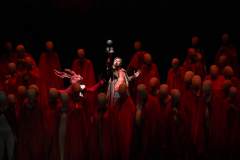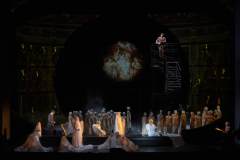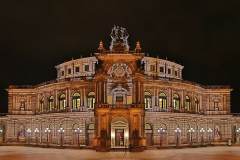Mefistofele
Mo | Tu | We | Th | Fr | Sa | Su |
Mefistofele - Arrigo Boito
Opera in a prologue, four acts and an epilogue
Libretto by the composer after Johann Wolfgang von Goethe's Faust
Performed in Italian with German and English supertitles
Premiere: 28. September 2024
Storyline
Prologue
A world of heavenly hosts singing praise appears created, to which Mefistofele only responds with contemptuous derision. Because of their pretensions to reason, people no longer allow themselves to be seduced into evil. Mefistofele answers the question of whether he knows Faust by betting that he can instill new illusions in the ambitious man and win him over to his side.
Act I
“Easter Sunday”
While the large crowd is amusing themselves at a lively folk festival brimming with the freshness of spring, the lonely and weary Faust withdraws and, accompanied by his loyal assistant Wagner, indulges in effusive reflections on nature. Mefistofele is present, but Faust does not recognize him, sensing only a gloomy figure who fills him with dread.
“The Pact”
Mefistofele reveals himself as the destroyer of creation and offers Faust his services: He is the spirit that always denies, and cynically professes his nihilistic worldview. Since he cares little about a life after death, Faust enters into the pact: if Mefistofele can grant him a moment that is beautiful for eternity, he will gladly be his servant in the hereafter. The two of them depart.
Act II
“Garden”
Reawakened to youthfulness, Faust, in love, goes for a stroll with the inexperienced Margherita, while Mefistofele half-heartedly walks with her interested neighbor Martha. Margherita asks Faust what he believes in; Faust only wants a rush of love. Faust hands Margherita a sleeping pill for her mother so that he can return unnoticed to enjoy the eagerly anticipated night of love.
“Walpurgis Night”
Mefistofele leads Faust into the deep abysses of the witches' sabbath. At the orgiastic climax, Faust sees the dead Margherita, and Mefistofele struggles to blot out this image from his mind through ecstasy.
Act III
“Dungeon”
Margherita awaits her execution in prison. She unwittingly poisoned her mother with the supposed sleeping pill and killed her own child in distress. Faust wants to free her from the dungeon, but the utopian dream of fleeing together to an idyllic island is not possible. When Mefistofele urges him to hurry, Margherita recognizes him and shrinks back. She is judged and saved.
Act IV
“Night of the Classical Sabbath”
Faust flees into his Arcadian dream world, whose enchanting poetry Mefistofele does not understand. Faust now sees the “beautiful Helen” as embodying the ancient ideal of eternal beauty and grace and believes he has discovered the secret of love.
Epilogue
Faust sees the end of his life approaching, but he has thus far been denied a moment that is beautiful for eternity. With Margherita, he has experienced the pleasure and sorrows of earthly love, with Helen the limitation of imagined worlds. Only in his own aspiration to make possible a better reality does Faust recognize the moment that is beautiful for eternity, and in this way eludes Mefistofele's influence.
Program and cast
Mefistofele: Krzysztof Bączyk
Faust: Pavol Breslik (September 28, October 1, 6, 10, 13, 2024), José Simerilla Romero (October 18, 24, 2024)
Margherita: Marjukka Tepponen
Marta: Nicole Chirka
Wagner: Omar Mancini
Pantalis: Dominika Škrabalová
Elena: Clara Nadeshdin
Nereo: Jongwoo Hong
Eine Frau: Martina Gedeck
Conductor: Andrea Battistoni
Staging: Eva-Maria Höckmayr
Set Design & Video: Momme Hinrichs
Costume Design: Julia Rösler
Lighting Design: Olaf Freese
Choir: Jan Hoffmann
Children Choir: Claudia Sebastian-Bertsch, Kinderchor der Semperoper Dresden
Dramaturgy: Dorothee Harpain, Alexander Meier-Dörzenbach
Semperoper Dresden
The Semperoper is the opera house of the Sächsische Staatsoper Dresden (Saxon State Opera) and the concert hall of the Sächsische Staatskapelle Dresden (Saxon State Orchestra). It is also home to the Semperoper ballet. The building is located near the Elbe River in the historic centre of Dresden, Germany.
The opera house was originally built by the architect Gottfried Semper in 1841. After a devastating fire in 1869, the opera house was rebuilt, partly again by Semper, and completed in 1878. The opera house has a long history of premieres, including major works by Richard Wagner and Richard Strauss.
The first opera house at the location of today's Semperoper was built by the architect Gottfried Semper. It opened on 13 April 1841 with an opera by Carl Maria von Weber. The building style itself is debated among many, as it has features that appear in three styles; Early Renaissance and Baroque, with Corinthian style pillars typical of Greek classical revival. Perhaps the most suitable label for this style would be eclecticism, where influences from many styles are used, a practice most common during this period. Nevertheless, the opera building, Semper's first, is regarded as one of the most beautiful European opera houses.

 EN
EN DE
DE IT
IT FR
FR ES
ES RU
RU JP
JP RO
RO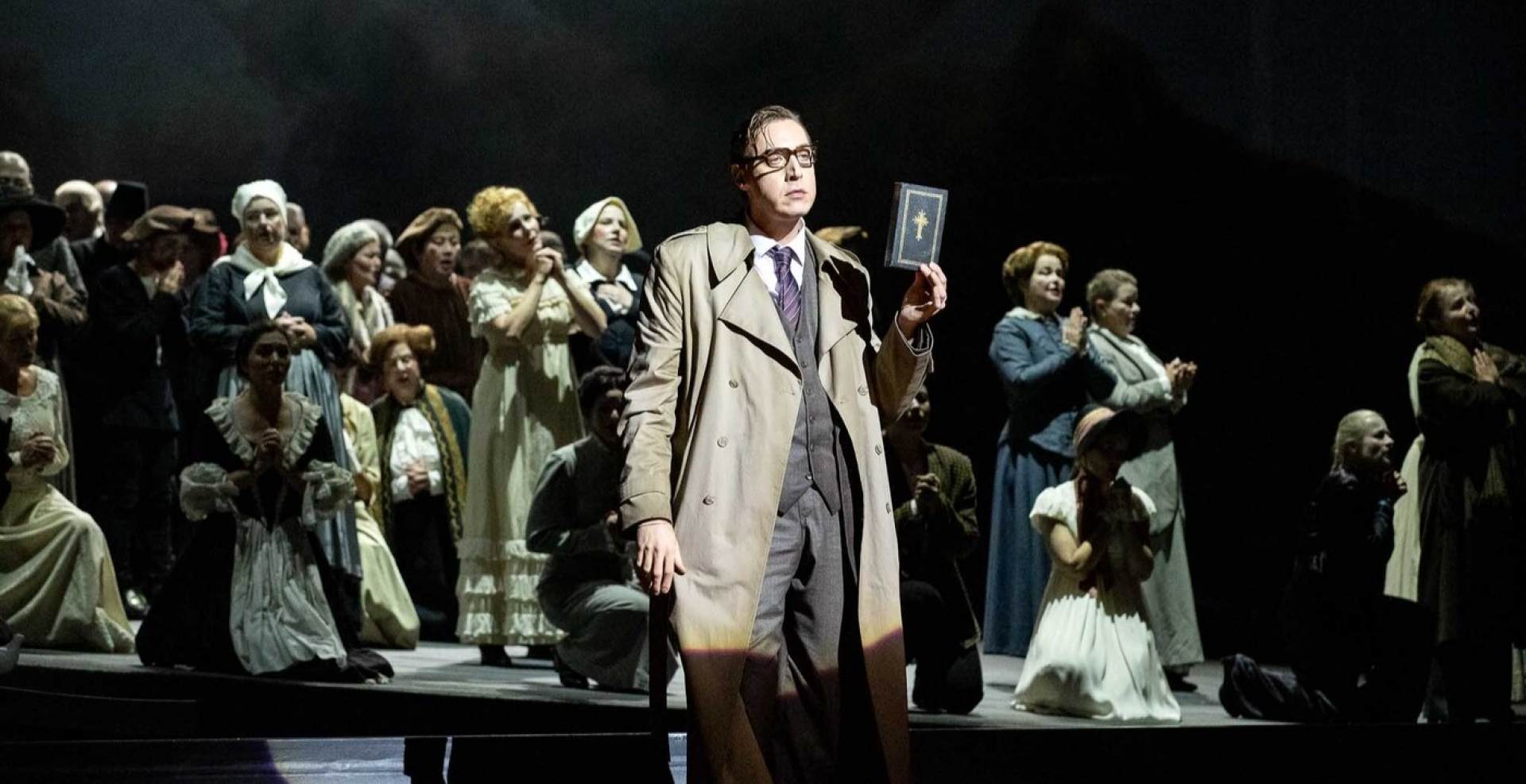
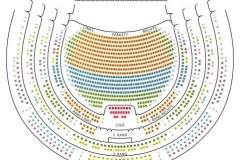 Seating plan
Seating plan 
